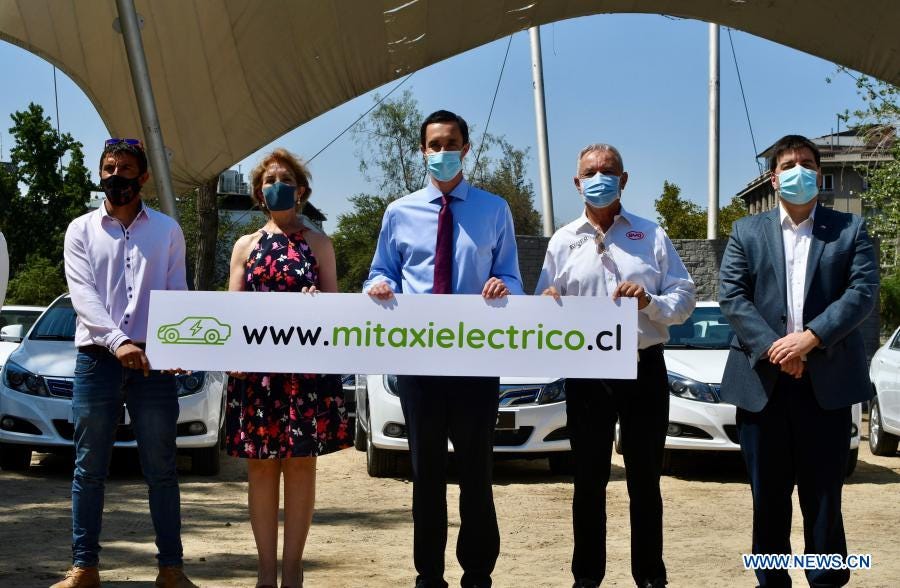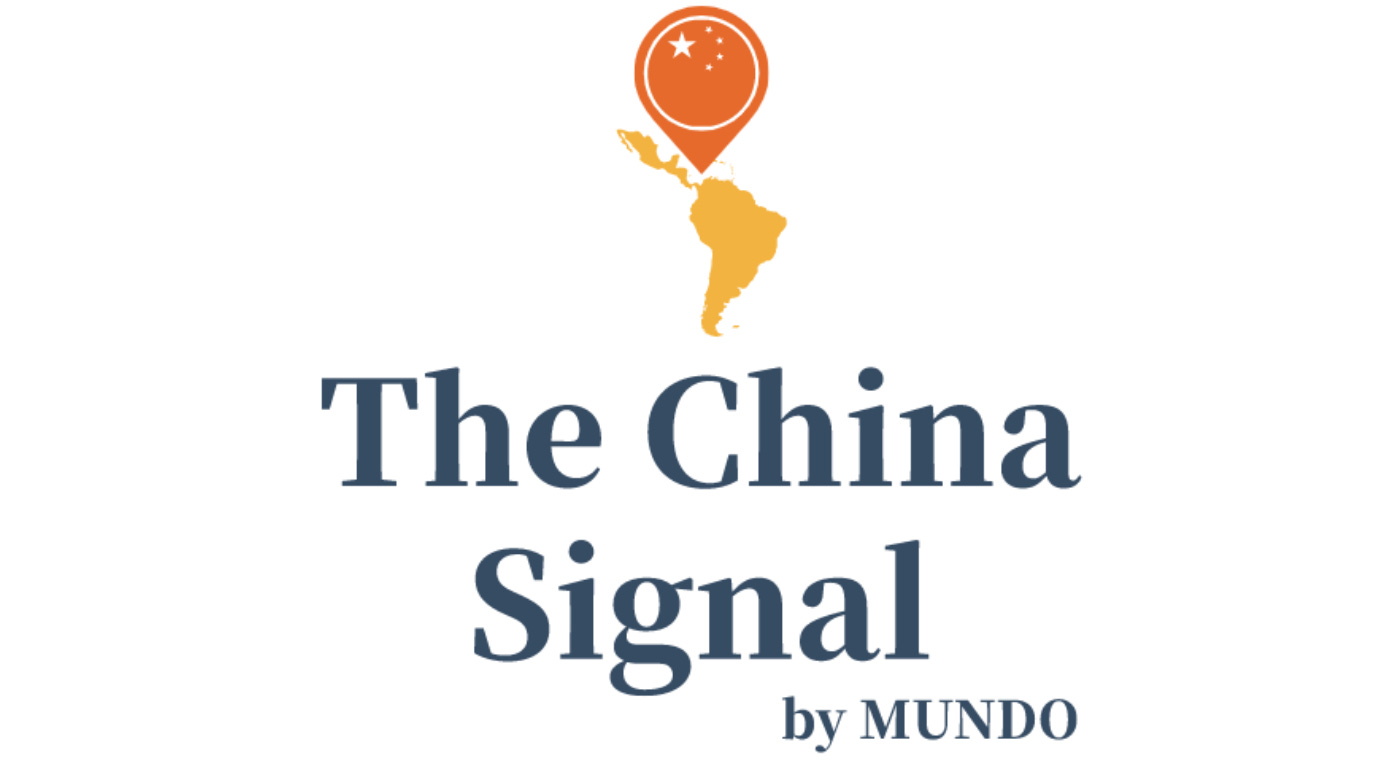The China Signal - January 22
BYD in Chile, 5G in Brazil, Norinco bids to Argentina's army, China's soft power reviewed
G’day, and welcome to The China Signal! This week, electric vehicle company BYD inks a plan to grow its presence in Chile, 5G politics in Brazil, Norinco bids to supply armoured vehicles to Argentina’s army, and an overview of China’s soft power efforts across the region.
Thanks to everyone who signed up this week, and thank you to those who shared The China Signal with your network. Please keep doing so! I’ve had some terrific conversations with some of you too, and I look forward to connecting with more of you in the coming weeks.
Deals and Investments
Chile
*Xinhua is a Chinese state media outlet* Chile unveils plan to spur electromobility with Chinese-made electric taxis - Xinhua | English.news.cn - January 19, 2021

The Chilean government on Tuesday unveiled a plan to encourage transition from fossil-fuel taxis to electric-powered ones, with the participation of Chinese company BYD.
The program will offer subsidies to transition from conventional to electric taxis, as well as sell and install residential electric chargers, and provide a one-year follow-up of the electric vehicles.
According to the ministry, electric vehicle makers were invited to participate in the selection process to elect the single supplier for the program and China's BYD was the winner.
Last week’s TCS detailed BYD’s successful bid to supply Colombia’s capital Bogotá with an additional 1,000 electric buses.
5G
Brazil
Note: I’m not so sure how about this report. Estado de S. Paulo’s story appears to be based on comments from Vice President Hamilton Mourão, who has a history of advocating for Huawei, and is a major political rival to Bolsonaro. Bolsonaro is against Huawei having any role in Brazil’s 5G rollout. If anything, this article should serve as a reminder of the entanglement of Brazil’s bilateral relations with China and the country’s tumultuous domestic politics, as I’ve also detailed recently over covid-19 vaccines.
Brazil's Bolsonaro to allow China's Huawei in 5G auctions: newspaper | Reuters - January 16, 2021
Brazil’s government will not seek to bar Chinese telecom equipment maker Huawei Technologies Co Ltd from 5G network auctions slated for June this year, newspaper Estado de S. Paulo reported on Saturday, citing government and industry sources.
Financial costs potentially worth billions of dollars and the exit of ally President Donald Trump from the White House are forcing President Jair Bolsonaro to backtrack on his opposition to Huawei bidding to provide the next generation cellular network for carriers in Brazil, the paper said.
Estado de S. Paulo quoted [Vice President Hamilton] Mourao as saying all companies that provide the necessary guarantees on respecting Brazil’s national sovereignty and data protection will be allowed to offer 5G equipment in the country.
Chinese state-run media outlet CGTN was only too happy to publish Reuters’ article through their own network, picking up on Reuters’ reference that Trump and Bolsonaro oppose Huawei on the “unproven grounds that it shares confidential data with the Chinese government”. American officials would take umbrage to the phrase “unproven”, instead arguing that the reasoning for rejecting Huawei is valid, but confidential.
Military
Argentina
[Paraphrased translation]
“China’s latest offer to Argentina for armoured 8x8 vehicles”
The Chinese firm Norinco is finalising a new offer to supply its armoured 8x8 vehicles to the Argentine Army, according to Argentina’s Minister of Defense, Agustín Rossi, following a video call with China’s Ambassador to Argentina, Zou Xiaoli.
La empresa china Norinco (North Industries Corporation) se encuentra ultimando una nueva oferta para el suministro de sus vehículos blindados 8x8 al Ejército Argentino, según informó el ministro de Defensa de Argentina, Agustín Rossi, tras mantener una reunión por videoconferencia con el embajador de China en Buenos Aires, Zou Xiaoli.
The Defense Minister insisted he has different options on the table for the renewal of the Army’s armed vehicles. In an interview he gave to Infodefensa.com in December, Rossi said that three proposals are being analysed: the General Dynamics’ (an American firm) “Stryker”, the Iveco (Italian) “Guaraní” 6x6 (manufactured in Iveco’s Brazilian factory), and the Norinco 8x8. The minister assured a final decision will be made this year.
En este sentido, el reponsable de Defensa insitió en que su cartera cuenta con distintas opciones sobre la mesa para la renovación de los vehículos blindados a rueda del Ejército. En la entrevista que brindó a Infodefensa.com en diciembre, Rossi afirmó que se están analizando tres propuestas: los General Dynamics Stryker, los Iveco Guaraní 6x6 y los Norinco 8x8. Con respecto a los plazos, el ministro aseguró que la decisión final se tomará a lo largo de este año.
Note: Norinco was recently named on the U.S. Government’s list of “Communist Chinese Military Companies” (CCMCs), following an Executive Order last December to prevent “United States capital to resource and to enable the development and modernization of [China’s] military.”
U.S. persons are prohibited from purchasing any publicly traded securities or derivatives from this list, including investing in funds with CCMCs as an underlying security, regardless of their underlying share in the fund (more details here). No doubt the U.S. government is indicating the consequences should the Argentine government opt for Norinco’s vehicles.
Argentina’s Army is also expecting the arrival of a portable hospital in the coming days, part of a flow of supplies sent by China since the beginning of the pandemic. Argentina’s Army has received thermometers, rain coats, chin straps[!], gloves, glasses, and “smart helmets” equipped with thermal sensors. [Quantities were not detailed in this article].
Asimismo, durante el encuentro se anticipó que en los próximos días llegará al país un hospital reubicable donado por las autoridades chinas, como parte de los insumos que el país asiático ha enviado a Argentina desde el incio de la pandemia y que fueron destinados al fortalecimiento de la sanidad militar. Entre el material recibido se encuentran pistolas-termómetro, impermeables, barbijos, guantes, gafas y cascos inteligentes equipados con sensores térmicos.
China’s Soft Power and Public Diplomacy
Certainly, China has launched many initiatives to increase its clout over journalists, academics, politicians, and policymakers in LAC, a region where the United States historically has wielded the most influence over these opinion leaders. But the results of China’s media, information, and civil society offensive in LAC have been mixed, and Beijing’s prospects for improving its regional soft power are still unclear.
Chinese ambitions to influence local media and promote Beijing’s preferred narrative – about issues related to Chinese foreign and domestic policy – through official Chinese news outlets are hindered by the unfree, staid nature of Chinese outlets like Xinhua and China Global Television Network, or CGTN. But while China’s state news outlets may be failing to win audience share and sway minds in Latin America and the Caribbean, Beijing has been more successful in other media, information, and civil society efforts.
For one, there are emerging forms of cooperation between Chinese and Latin American media that insert Beijing’s narrative organically into local news outlet’s content, sometimes without consumers realizing where the content comes from.
I pointed out an instance of this in TCS January 8, with MercoPress publishing a verbatim account from Chinese state media on a recent meeting between Argentina’s President Alberto Fernandez and China’s Xi Jinping.
In addition, Beijing has been successful in using fully funded trips to China, scholarships to prestigious Chinese universities, and exchange programs, to directly expose government officials, politicians, academics, journalists, and students from the region to China’s remarkable economic growth, poverty reduction, and innovation, all of which can make a positive impression on visitors. China’s meteoric rise especially appeals to many in LAC, a developing region marked for decades by poverty, inequality and low growth.
An example of this is a two-year scholarship to study in China awarded by the “Colombia-China Friendship Association” to a young Colombian architect this week, and reported in local press. Although as the author correctly notes, China’s exchange and scholarship programs still pale in comparison to the United States’:
The numbers are impressive, but still dwarfed by the enrollment of Latin Americans in U.S. universities, which reached 81,000 students in the 2018-2019 academic year.
In key countries in Latin America and the Caribbean, in fact, China is increasingly winning the public opinion battle with the United States, but not necessarily because of the influence of China’s media and information efforts. It has been winning the public opinion battle in part because of the deterioration of U.S. prestige caused by the behavior of President Donald Trump, including his anti-immigrant and anti-Mexico rhetoric.
Read the full report here. I’d particularly recommend pages 1-7 on Brazil’s various pro-China business sectors, and pages 15-21 on China’s efforts to infiltrate local media, albeit with limited success so far.




